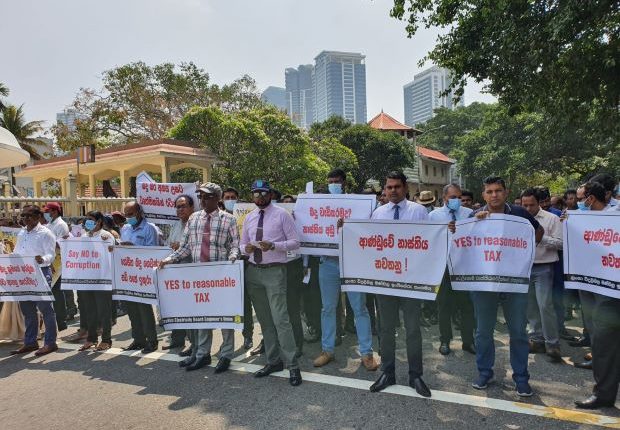CEB experienced staff in alarming exodus after inflation, taxes says Union
COLOMBO – Sri Lanka’s state-run Ceylon Electricity Board (CEB) is losing qualified engineers at an alarming rate after a currency collapse and new progressive taxes slapped on the debased salary, and they are not coming back, union officials said.
CEB has a cadre of around 1,000 engineers but they have been usually managing with lower levels of around 900, they said.
Since 2022, about 150 have left the CEB for foreign countries, leading to serious gaps in some branches with engineering staff down to about 750, Dhanushka Parakramasinghe, President of the CEB Engineers Union (CEBEU) told reporters in Colombo.
Sri Lanka’s rupee collapsed from 200 to 330 to the US dollar in 2022 after two years of money printed by macro-economists to target ‘potential output’ using a ‘data-driven’ monetary policy, followed by a float failure with a surrender rule.
About 105 engineers have resigned and about 54 have taken leave, Parakramasinghe said.
Most have left with jobs already found.
There have been reports that doctors who left the country are coming back.
“Engineers are not coming back,” Parakramasinghe said. “Some are coming back to resign. Some who left on leave having got PR, have sent resignation letters from abroad.”
Engineers are leaving for Ireland, Australia and New Zealand, to work in utilities and also the mining sector.
Sri Lanka’s coal power complex needs 96 staff and they are now down to 70, he said. CEB runs in shifts, round the clock.
Coal plant staff can easily get jobs in the mining sector in many countries including South Africa, where heavy machinery is in operation, he said.
“But our people usually like to go to Australia or Western European countries,” Parakramasinghe said.
Those who are leaving are offered jobs from 4,000 to 8,000 dollars based on experience and type of jobs, he said.
Engineers working in operations and maintenance (O & M) in transmission and generators are also in high demand abroad, the Union said.
An entry level engineer gets around 150,000 to 170,000 rupees, at the CEB. It works out to around 5 dollars a day. At the central bank, which debases money, office assistants were paid 186,000 according to disclosures made in Parliament.
Sri Lanka’s progressive taxes under an International Monetary Fund program, apply from around 3 dollars a day (100,000 rupees) through pay-as-you-earn taxes.
On one side senior staff are retiring and the CEB is seeing a drain of middle-level staff who have about 10 years of experience, who are next in line, the Union said.
CEB will have problems maintaining service if the staff go abroad at this level, Buddhika Wijayawardhana, joint secretary of the CEBEU said.
There is also no incentive for young graduates to join the CEB under current conditions, he said.
Sri Lanka has some of the highest housing costs in the world, based on calculations done by reputed organizations, union officials said, and acquiring a house is now next to impossible. The same applies to a car.
Comparable living standards elsewhere were much higher. Salary was a key reason for people leaving.
At one time low interest rates were given for staff for housing, which was now in doubt he said.
After Sri Lanka’s rupee was left without a credible monetary anchor from around 1978, Sri Lanka’s interest rates and inflation shot up for ordinary people but some private and state entities gave low-interest rate loans to staff.
-economynext.com



Comments are closed, but trackbacks and pingbacks are open.